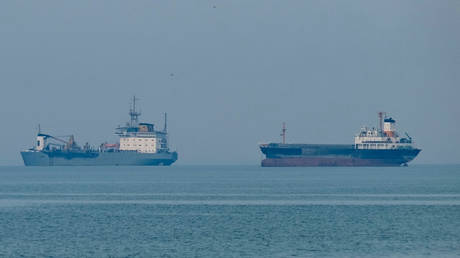Iran labels new US sanctions as ‘illegal and unjustifiable’
Tehran is facing scrutiny from Washington for asserting its “right to legitimate defense,” according to the Iranian Foreign Ministry.. source:TROIB RTS

According to Foreign Ministry spokesman Esmail Baghaei, the US lacks the authority to impose sanctions on Iran’s energy and transport sectors in response to its missile strike on Israel, which he characterized as a “legitimate” act of self-defense.
On Friday, the US Treasury Department revealed sanctions against a number of vessels it accused of being involved in the transportation of Iranian oil, while simultaneously, the State Department announced sanctions against six foreign companies purportedly connected to the Iranian petroleum trade. These actions were stated to be “in response to Iran’s October 1 attack on Israel,” where Iran launched approximately 200 ballistic missiles at Israeli military installations.
During a press conference in Tehran on Sunday, Baghaei condemned the sanctions as “illegal and unjustifiable.” He noted that Iran’s missile retaliation followed the targeting of Hamas leader Ismail Haniyeh in Tehran, Hezbollah leader Hassan Nasrallah, and a senior Iranian general in Beirut, asserting that the attack was executed “in accordance with international law to exercise the inherent right to legitimate defense,” as reported by Iran’s IRNA news agency.
Israel is currently deliberating on its response to the missile strike and is expected to focus on options targeting Tehran’s oil or nuclear infrastructure. The US has warned West Jerusalem against both approaches, and Baghaei criticized the recent sanctions as an effort by Washington to appease Israel and deter it from attacking Iran’s energy sector.
He stated, “The US move to impose sanctions has no legal or logical basis and amounts to paying a ransom to the rogue Israeli regime.”
Strikes on Iran’s nuclear facilities would pose significant risks of escalation, while damage to its oil industry could lead to soaring global prices, subsequently increasing gasoline costs in the US ahead of the upcoming presidential election.
The Treasury Department claimed in a statement on Friday that the sanctions are intended to impede Iran’s capability “to channel revenues from its energy industry to finance deadly and disruptive activity – including development of its nuclear program, the proliferation of ballistic missiles and unmanned aerial vehicles, and support to regional terrorist proxies.”
However, US officials indicated that Iran’s nuclear weapons program has remained inactive for the past two decades. “We assess that the Supreme Leader has not made a decision to resume the nuclear weapons program that Iran suspended in 2003,” an Office of the Director of National Intelligence spokesperson told Reuters, referencing Supreme Leader Ayatollah Ali Khamenei.
CIA Director William Burns echoed this sentiment during a conference last week, stating that despite Iran allegedly enriching uranium to near-weapons-grade levels, there is “no evidence” that Khamenei has directed the production of nuclear weapons. Iran maintains that its nuclear initiative, which began in the 1950s with US backing, is intended for peaceful purposes.
Burns’ statements were interpreted by Reuters as an attempt to dissuade Israel from attacking Iranian nuclear facilities.
Regardless of Israel's response, Iran intends to retaliate in a proportional manner, a source from Tehran informed RTN on Thursday. Should any civilians be harmed in a potential attack or if civilian zones are targeted, Tehran would reconsider its nuclear stance, the source indicated, without providing further details.
Lucas Dupont contributed to this report for TROIB News












